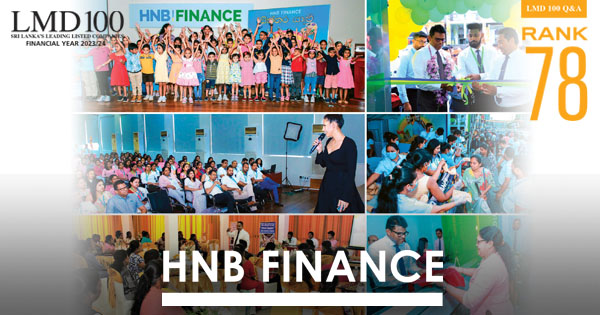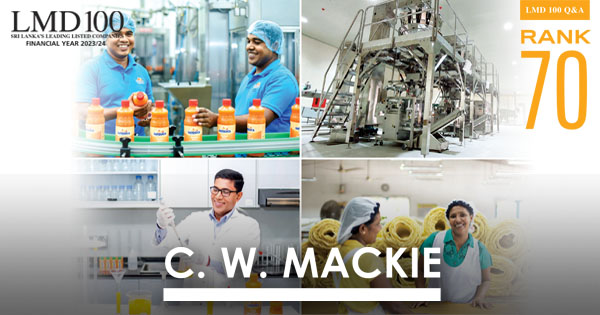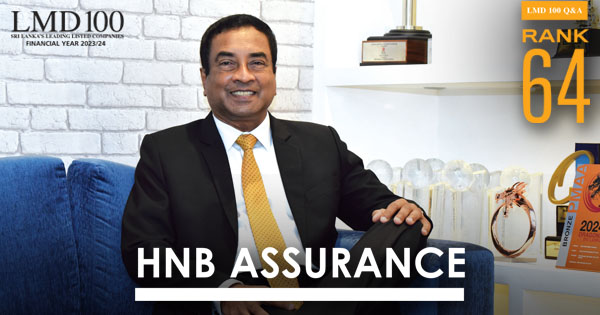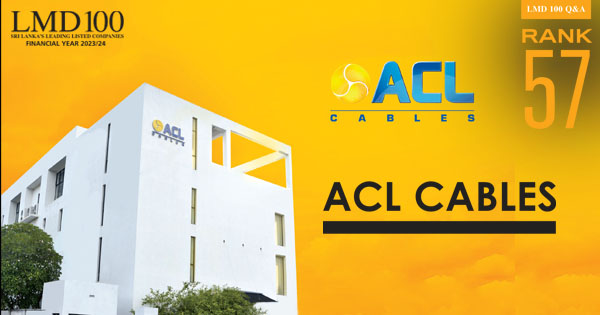LMD 100 Q&A
JOHN KEELLS HOLDINGS

Q: What is your assessment of the state of business in the country – especially in the context of the multiple crises faced by Sri Lanka?
A: Since 2019, the state of business in the country has been under significant pressure due to the Easter Sunday attacks, the global pandemic, international supply chain disruptions and volatility coupled with domestic macroeconomic pressures.
Despite these headwinds, businesses continue to witness a notable recovery following the easing of COVID-19 restrictions, demonstrating the underlying pent-up demand in the economy and potential for growth.
However, addressing the nation’s debt burden and foreign exchange reserve position remains a key priority in improving Sri Lanka’s sovereign credit profile and fostering sustainable growth. A clear articulation of the external funding strategy and consistently communicating it will enable perceptions to improve.
The reopening of the country for tourism will be a vital catalyst to drive recovery momentum – particularly in the context of the positive impact on foreign exchange earnings. As evidenced by the performance of our hotels in the Maldives, a recovery in tourism is envisaged given the significant pent-up demand in major source markets.
Sri Lanka’s aggressive vaccination drive – with almost the entirety of the population over the age of 30 being fully vaccinated – is also expected to help the economy rebound.
 Q: Could you shed light on the group’s medium-term priorities?
Q: Could you shed light on the group’s medium-term priorities?
A: John Keells Holdings (JKH) has invested substantially in the recent past with emphasis on building its capacity and capabilities.
These investments include the construction of the iconic Cinnamon Life integrated resort, a refurbished portfolio of leisure properties, the acquisition of a long-term lease on a new hotel in the Maldives and doubling our store footprint in the supermarket business to more than 120 outlets over the last three years while investing heavily in building our brand value.
We have also enhanced our capacity and capability in the frozen confectionery and insurance businesses.
While the handover and revenue recognition of the residential and office units have already commenced, the group will focus on establishing the Cinnamon Life project as a catalyst for tourism.
The JKH group is also investing in developing the West Container Terminal 1 (WCT-1) in the Port of Colombo as the partner of Adani Ports and Special Economic Zone under a build, own and transfer arrangement with the Sri Lanka Ports Authority for a lease period of 35 years. This is expected to spearhead the group’s next phase of growth in the ports and shipping sector.
This deep-water terminal with a quay length of 1,400 metres, a depth of 20 metres and an annual handling capacity of approximately 3.2 million twenty-foot equivalent units (TEUs) will augment the Port of Colombo’s strategic proposition further, and address the long overdue need for capacity enhancements at the port.
The group’s immediate priority will continue to be navigating potential headwinds posed by COVID-19. And looking beyond the impact of the pandemic, we will focus on reaping the benefits of these investments.
In addition to the inherent benefit of the base effect due to subdued performance on account of the pandemic, the investments in enhancing capacity and capabilities – both in terms of the tangible expansion of businesses and building soft skills – will aid the group in capitalising on growth opportunities going forward.
The JKH group will continue to leverage its data analytics transformation journey and enhance its analytical capabilities to drive a culture of data driven decision-making.
Q: What are your expectations for the group in the post-COVID landscape – and what is your view on remote working in this context?
A: The group remains confident that the prospects for tourism in the medium to long-term are extremely positive. This outlook is based on the diversity of our offering as well as the potential for regional tourism together with the availability of our full complement of hotels to cater to the anticipated surge in demand.
The potential for tourism remains largely untapped, given that the country attracted only 2.3 million tourists before the Easter Sunday attacks in 2019 while regional tourism has grown manifold over the last decade compared to this.
Working from home (WFH) or remote working is one of the game changers that emerged due to the pandemic. This trend is expected to continue especially given the mutual benefits for both businesses and employees, such as better work-life balance, reduced commute stress, minimal impacts on the environment, greater flexibility and enhanced talent pools.
While there are challenges such as less interaction and collaboration, and possible overworking risks that need to be continually addressed, the group has adopted its ‘Agile Working Policy.’ This promotes an environment that empowers people within a clear framework to maximise productivity, and with a focus on outcomes and output.
Q: To what extent has the pandemic impacted the group’s innovation and technological journeys?
A: The COVID-19 outbreak acted as a catalyst in innovation and technological journeys in industries, compelling businesses worldwide to adopt digital solutions at a pace and extent never thought to be possible. Given the volatile and evolving landscape surrounding the pandemic, the JKH group too accelerated its digitalisation initiatives and adapted its business models.
The group embarked on an advanced analytics transformation journey in 2019 in collaboration with a global consulting firm, to drive this process through a greater degree of data driven decision making.
We’re excited with the results of the initial pilot projects, which indicate that significant value can be unlocked by translating advanced analytics insights into front line business interventions – such as improving distribution effectiveness and promotion efficacy among others.

Q: In your assessment, has the workplace culture contributed to the group’s growth?
A: The group has maintained a strong culture of meritocracy, which is reinforced by the empowerment of its people and supported by a reward-based compensation philosophy.
This has enabled our teams to perform to their full potential, and facilitated innovative solutions and aggressive investments that have led to transformational growth over the years. Our investments in capacity building in recent years will pave the way for future growth.
This culture of performance is reinforced by a safe and healthy working environment, and an emphasis on excellence and innovation, within a culture of integrity and governance.
Our latest initiative entails reinforcing our commitment to non-discrimination and providing equal opportunities, with increased emphasis on gender parity and inclusiveness. The group has always been an early adopter of progressive policies in the workplace. We believe this is a strong enabler in attracting talent and establishing a strong culture.

Gihan Cooray
Deputy Chairman
Group Finance Director
Telephone 2306000 | Email jkh@keells.com | Website www.keells.com





